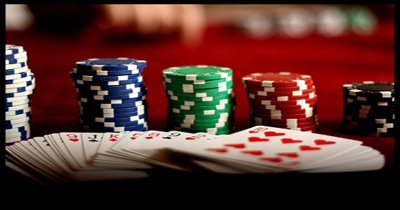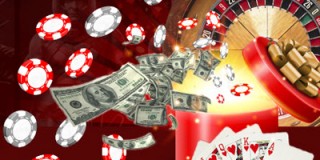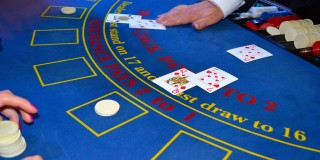With its quick-fire rounds and high strategy maneuvers, it is no wonder that blackjack is the second most popular casino game in the world.
You can try play blackjack below:
-
1
 100% Bonus Up To 250£ Welcome Package! T&Cs; Apply - 18+ Payout Ratio: 98.765%MicrogamingPlay Now
100% Bonus Up To 250£ Welcome Package! T&Cs; Apply - 18+ Payout Ratio: 98.765%MicrogamingPlay Now -
2
 100% Bonus Up To 5BTC Or 500 Euros - Welcome Package! T&Cs;' Apply - 18+ Payout Ratio: 98.623%Microgaming, NetEnt, Evolution Gaming, BetSoft, Play'n GO & ManPlay Now
100% Bonus Up To 5BTC Or 500 Euros - Welcome Package! T&Cs;' Apply - 18+ Payout Ratio: 98.623%Microgaming, NetEnt, Evolution Gaming, BetSoft, Play'n GO & ManPlay Now -
3
 100% Bonus Up To 1,000€ T&Cs; Apply - 18+ Payout Ratio: 98.45%Microgaming, NetEnt, Betsoft, AristocratPlay Now
100% Bonus Up To 1,000€ T&Cs; Apply - 18+ Payout Ratio: 98.45%Microgaming, NetEnt, Betsoft, AristocratPlay Now -
4
 100% Bonus Up To 100€ Welcome Bonus + 100 Free Spins!, T &C Apply, 18+ Payout Ratio: 97.89%Microgaming, NetEnt, NextGen, ELKPlay Now
100% Bonus Up To 100€ Welcome Bonus + 100 Free Spins!, T &C Apply, 18+ Payout Ratio: 97.89%Microgaming, NetEnt, NextGen, ELKPlay Now -
5
 100% Bonus Up To 1,000€ Ts & Cs Apply. Payout Ratio: 97.12%NetEnt, Evolution Gaming, AmayaPlay Now
100% Bonus Up To 1,000€ Ts & Cs Apply. Payout Ratio: 97.12%NetEnt, Evolution Gaming, AmayaPlay Now -
6
 100% Bonus Up To 100£ Free Spins And Free Cash. Ts And Cs Apply. Payout Ratio: 96.29%Microgaming, NetEnt, Evolution Gaming, Nyx Interactive, Play'nPlay Now
100% Bonus Up To 100£ Free Spins And Free Cash. Ts And Cs Apply. Payout Ratio: 96.29%Microgaming, NetEnt, Evolution Gaming, Nyx Interactive, Play'nPlay Now -
7
 100% Bonus Up To 1,000€ T&Cs; Apply - 18+ Payout Ratio: 98.79%MicrogamingPlay Now
100% Bonus Up To 1,000€ T&Cs; Apply - 18+ Payout Ratio: 98.79%MicrogamingPlay Now -
8
 100% Bonus Up To 50€ Ts & Cs Apply. Payout Ratio: 96%NetEnt, Betsoft, NextGen Gaming, PlaysonPlay Now
100% Bonus Up To 50€ Ts & Cs Apply. Payout Ratio: 96%NetEnt, Betsoft, NextGen Gaming, PlaysonPlay Now -
9
 100% Bonus Up To 750€ T&Cs; Apply - 18+ Payout Ratio: 96.91%MicrogamingPlay Now
100% Bonus Up To 750€ T&Cs; Apply - 18+ Payout Ratio: 96.91%MicrogamingPlay Now -
10
 100% Bonus Up To 500€ Matched Deposit Bonus And Free Spins. Ts & Cs Apply. Payout Ratio: 96.2%PlaytechPlay Now
100% Bonus Up To 500€ Matched Deposit Bonus And Free Spins. Ts & Cs Apply. Payout Ratio: 96.2%PlaytechPlay Now

Some believe that blackjack originated in 700BC, during the Roman occupation of Europe. The theory is that Romans would play the game using wooden blocks with numerical values, betting anything from gold to wives.
Though the exact origins of blackjack are unclear, there is evidence which suggests that it may have its roots in the Spanish game trente-un (thirty-one), which was referenced by a priest in 1440 and by the author of Don Quixote, Miguel de Cervantes, in 1570. Later incarnations of the game appeared in French casinos around the 16th Century. The version which became the game played in casinos today was then known as vingt-et-un, or twenty-one. The rules evolved from those used in trente-un, along with other popular card games such as the French quinze (fifteen) and Italian game known as sette e mezzo (seven-and-a-half).
The common objective of these games was to draw as close to a certain value as possible, without going bust. Its popularity stemmed from the ability of the player to make decisions about the game, giving them a feeling of control and skill over the outcome.
The game of twenty-one travelled over the Atlantic after the French Revolution, fast becoming a favourite past time of experienced card players and beginners. In the 19th Century, casinos promoted the game by offering a 10-1 bonus if the player’s final hand consisted of an ace of spades and a black jack, either clubs or spades. Though the promotion only ran for a short time, it secured the game’s popularity and provided it with a new name; blackjack.
As the craze for real blackjack swept the States, new rules were introduced which made it easier to beat the dealer. A pattern of hitting on a 16 and standing on a 17 was established, and players could see the dealer’s upcard before deciding on their next move. This was unheard of in European casinos, which always played the dealer’s card face-down and left players more open to chance.
In 1962, mathematician Edward Thorpe released the book 'Beat the Dealer' which pioneered the concept of basic blackjack strategy. He investigated the maths behind blackjack and discovered that players could gain an edge over the dealer by keeping track of the cards in play. This became known as card-counting, a practice which was so effective that it was eventually banned by casinos. Thorpe also produced a table of moves to help players turn the game from random chance into a skilful art form.
These days, blackjack is still as popular as ever, with many players taking their chances at playing on a professional level. Blackjack tables take up the most tables in almost all casinos, because the game generates more revenue than any other table game. The live dealer game has beat the odds and managed to survive against competition from poker rooms and advances in online technology. Professional teams are becoming increasingly common, as many players opt to pool their resources and strategies to try and win big. Blackjack is a game which has evolved over many centuries, travelling across the world to become one of the most popular casino games of all time.




